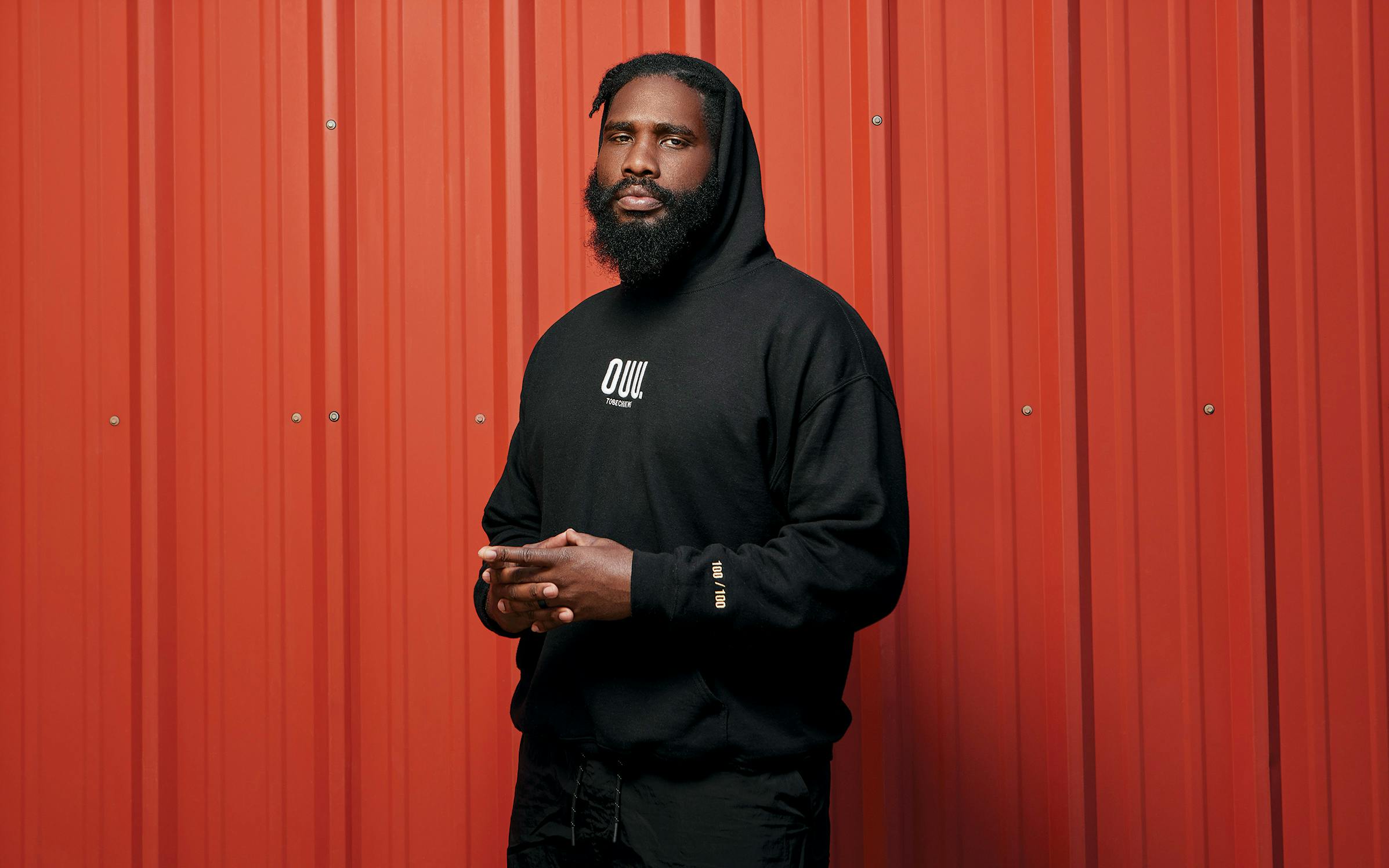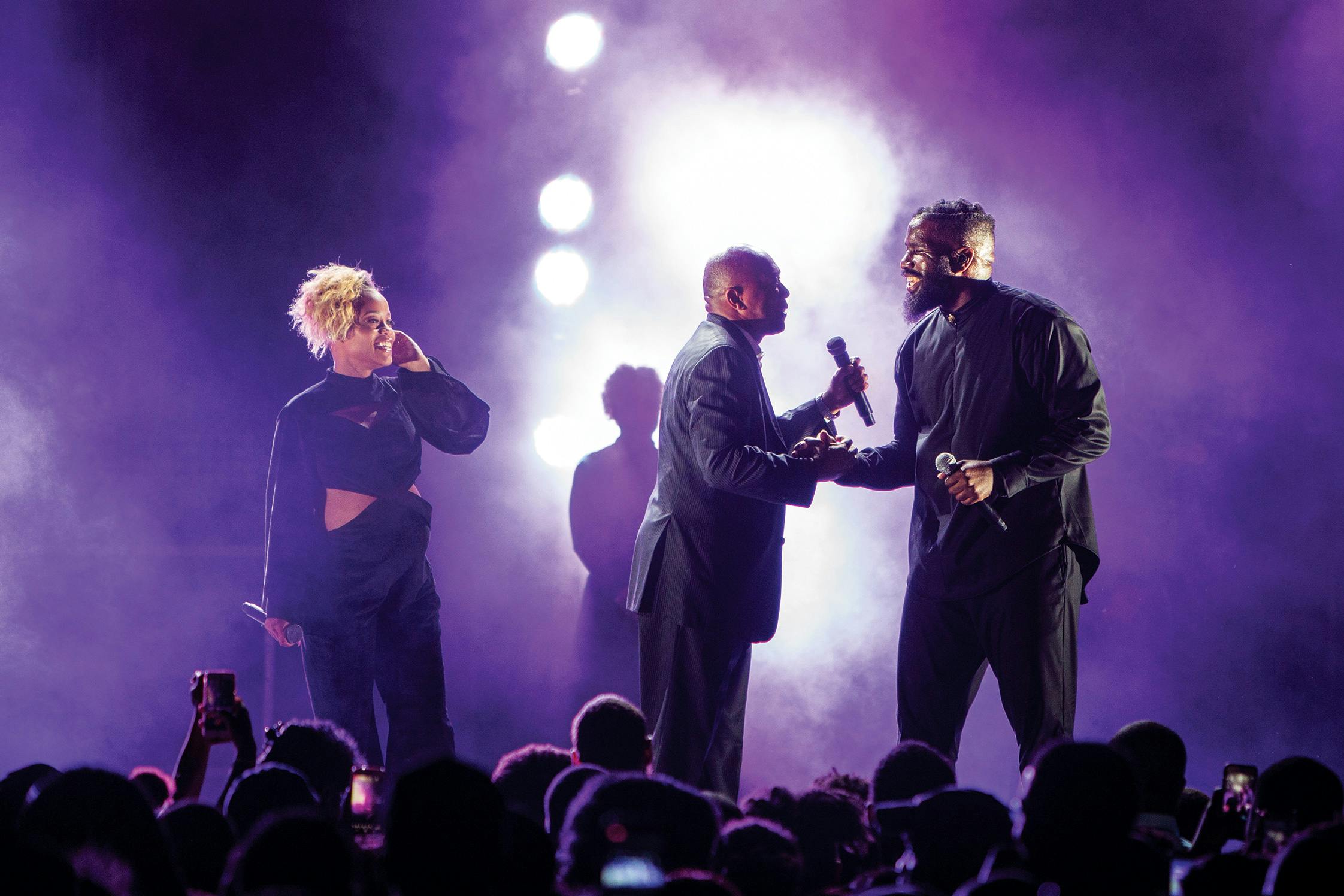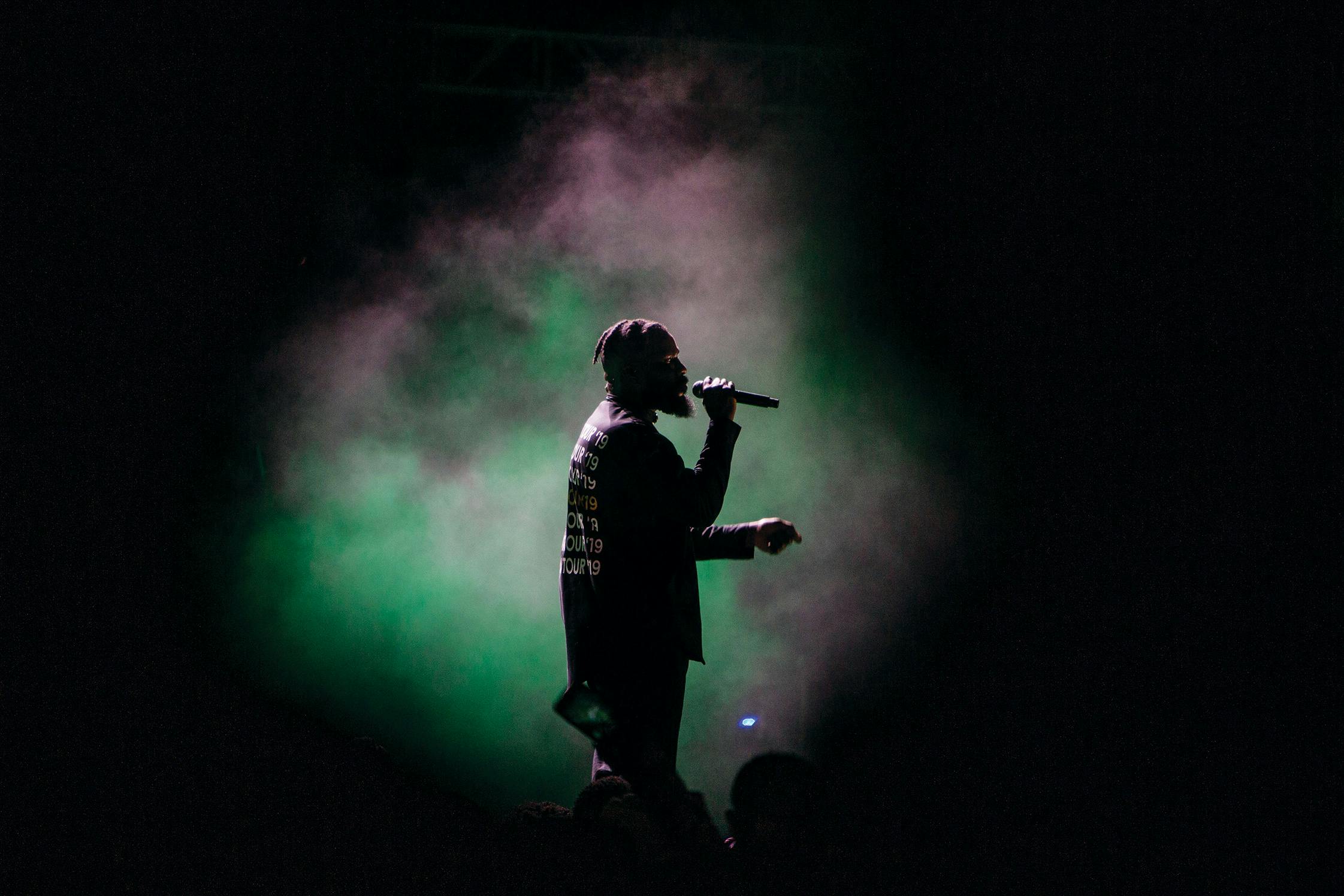One of the most captivating up-and-coming rappers in Texas is a first-generation Nigerian-Houstonian named Tobechukwu Nwigwe. While he’ll proudly tell you that Tobechukwu means “praise God” in the Igbo language of southeastern Nigeria, you can just call him “Tobe.” It’s an important name to remember if you’re a fan of hip-hop, or music in general. The adoration for the 32-year-old has been swift, distinguished, and broadcast widely on social media—mostly by Nwigwe himself, who tends to celebrate the praise by howling like a man speeding down the first steep drop of a roller coaster. Fans include Dave Chappelle, Erykah Badu—“Love it. All of it,” she once texted Nwigwe—and Jill Scott, whose Facebook post about his self-released album The Originals read: “I don’t throw around the word genius so take this seriously. This entire work is genius.”
Such notable endorsements aren’t typical for a new artist like Nwigwe, who performed his first live solo show less than a year ago. Houston rap icon Paul Wall, who knows about hype, told me, “I can’t really think of someone from my area who got those out-of-town props this early in his career. He’s like the new people’s champ.”
The key to Nwigwe’s distinction: Instagram. Instead of pursuing traditional club gigs and radio play, like any aspiring performer since the 1950s, Nwigwe launched himself via social media—specifically, through #getTWISTEDsundays, an ongoing series that delivers a new Tobe Nwigwe music video at the beginning of each week. These hypnotic songs speak to his childhood stomping grounds in “the SWAT” (Southwest Alief, Texas—his Houston suburb); Forum Park (an Alief neighborhood known for gang violence); his wife, who simply goes by “Fat” (though she is not); warnings about his ability to defend himself (don’t cross him); and God. More often than not, his work advances a galvanizing message to push through adversity, such as this verse from “Shine”:
The world can be toxic
Especially when your skin look like chocolate
Be cautious, all branches ain’t olive
And look towards the sun for your solace and
Shine, Shine, Shine on all of them

Now more than eighty videos and three years deep into Get Twisted Sundays, Nwigwe’s Instagram account has more than 300,000 followers. The videos, which originally embraced a low-production-value aesthetic, have more recently taken on a vibrant new look that’s at once both regal and street. In March 2018, he ratcheted up the production quality and started using videographers, dancers, and elaborate costumes and sets. Colors began playing a role: monochromatic blue, monochromatic white, pink and white, light green and gray. A typical video these days shows Nwigwe mid-screen, flanked by Fat and his music producer, LaNell “Nell” Grant, all looking into the camera unsmiling, as if posing for a Renaissance portrait. The trio starts swaying or making a choreographed gesture with their hands or walking in a certain direction until the camera moves or cuts and changes the dynamic to build all over again.
Excitement for his work has snowballed during the past twelve months, and Nwigwe’s songs have been earning him circulation and cash in commercials for Gatorade and Bose. This spring he sought to solidify his base the old-fashioned way as he embarked on the second leg of a tour that he started last fall: a set of thirteen dates that ended in Houston on April 20. He sold out cities he’d never played, and people have begun sending him requests to perform for audiences in Australia, Germany, the United Kingdom, and Africa.
Nwigwe’s audio engineer at Barren Studios, Chris Macek, told me that the rapper’s social media-first approach is breaking ground in Houston’s music landscape. Barren Studios alumnus and chart-topping hip-hop artist Travis Scott, for example, had to work alongside established acts for about five years before he could step into the spotlight. “Tobe is doing this himself,” Macek said, and in the process “writing a new playbook for other artists.” It’s not just the distribution method but the creative direction and the message—one that shows underprivileged kids that a person’s story matters, that it’s the thing that makes him or her unique, and that it can lead to a sense of purpose.
I met Nwigwe one afternoon in February, in a large, collective living room space of an apartment building in the Fourth Ward-Midtown area of Houston just before he went back on tour. He was sitting on a couch wearing light gray sweatpants and a matching, hooded sweatshirt, and he had a full beard, with his hair shaved close on the sides. Nell and Fat, also in sweatsuits, sat in adjacent chairs while a videographer, a manager, and other assistants wandered about. Fat was pregnant, and the group took turns holding several other babies belonging to Nell and other associates for a rotation of adoration.
“It’s like a family operation,” Nwigwe said. “You have to understand: We don’t get any radio play. Our biggest market is all on Instagram. We’re not signed to any label, we don’t have a booking agent, we don’t have anything. We are one hundred percent independent. This is all in-house.”
Your average person might be apprehensive about the notion of a small, amateur crew improvising a thirteen-date tour on top of a weekly video series. But if the undertaking ahead gave Nwigwe misgivings, he didn’t show it. “I expect the fan base to grow exponentially,” he said. “I expect the message to spread and the movement to grow. I expect this to be the launching pad to becoming a global brand.”

Nwigwe didn’t always imagine he’d project such imperial confidence about music, of all things. He liked music, and he freestyled like any self-respecting kid growing up in Alief. But Plan A was football. Plan B was wrestling—there was no Plan C.
He talks about playing football in high school and college, where he was a University of North Texas linebacker, the way some people might talk about a steamy love affair. His lethargic, deadpan way of talking gives the phrase “I was good at destroying people” an exhilarating quality. His self-professed facility for “knocking heads off” on the gridiron was a skill that required more discipline than you might think. When he was a defensive captain, his average day required waking at four in the morning so he could get to the gym and start his own strength-and-conditioning workout. He’d then stay for the team’s workout before attending classes, eating lunch, and returning for a noon workout. Afterward, he’d go to practice. “And this was just, like, my junior year,” he said.
By his senior year, he was UNT’s best player. Many observers thought he had a legitimate shot at being drafted into the NFL. He was sure he was going pro. He had the size, the speed, and the instinct. “He did a lot of things naturally that you don’t necessarily teach,” former UNT coach Darrell Dickey told me. “He could tell where the play was going.” Nwigwe’s parents, who had moved to Houston for college after growing up in small Nigerian villages and wanted all of their five children to find sensible jobs in the medical field, were finally accepting that their son Tobechukwu might not become a doctor.
Then, during a game against Florida Atlantic University halfway through the 2009 season, a teammate landed on Nwigwe’s left foot, rolling it to the side. Initially he experienced a mere twinge of discomfort, but as he continued playing, he felt what he describes as a “pop.” He didn’t know it at the time, but his football career was over.
Nwigwe went to the hospital for surgery to repair his foot, but he emerged from the recovery period a different man entirely. During his time off from football, his girlfriend left him, and his coaches and friends were too busy to visit. He heard the occasional piece of news about his team secondhand, and his future degree in fashion merchandising began to look indulgently whimsical. The lonely exile in his dorm room, and later at his parents’ house back in Houston, gave him a lot of time to think. “For the first time,” he explained, “I had to ask myself who I was outside of Tobe the Football Player. And, like, what was my purpose?”
He started attending local non-denominational churches, though he’d grown up Catholic, and he felt drawn to serve local children. In his songs, Nwigwe frequently references the violence far too prevalent in Forum Park: “ain’t no Bambis on my block / they get turned to deer meat” and “half my partners been thugging since they was just a fetus / swear they known for shooting and stabbing / if you ain’t on in my ‘hood, best you duck like you dabbing.”
The result of his contemplation, by 2012, was a nonprofit for Alief teens called Gini Bu Nkpa Gi (“What’s your purpose?”)—TeamGINI for short. He worked full-time on TeamGINI, what he called an “edutainment” venture that would inspire kids in his hometown neighborhood with small productions of skits and raps. As he entered a relationship with Fat (née Ivory Rogers), a portrait artist whom he met at church, she started helping TeamGINI. Then Nell, whom Nwigwe knew in high school, mentioned one day that she was taking classes in beats and music production while she taught high school English in Alief ISD. Nwigwe recruited her too.
He didn’t really think of himself as an entertainer until he met Eric Thomas, “the Hip-hop Preacher.” Thomas is a Detroit-based motivational speaker best known for imploring people to want to succeed as badly as they want to breathe—advice that any young adults living with their parents might eagerly embrace, and a notion Nwigwe internalized as he watched Thomas’s videos. At the end of one, a phone number scrolled across the screen, and Nwigwe decided to call and ask Thomas to speak at one of TeamGINI’s events. Thomas agreed, and before taking the TeamGINI stage a few weeks later, he watched with astonishment as Nwigwe performed a skit complete with an original script, actors, choreography, and music. The experience, Thomas told me, felt like watching some previously undiscovered great performer for the first time.
Thomas gave Nwigwe financial backing in 2017, and soon afterward Nwigwe got into the studio and started taking music as seriously as he did TeamGINI. He was on a mission now, and he had unearthed a powerful tool within himself to pursue it.
“Everybody who can understand what I’m saying in my music now—like, outside my target audience—it’s a blessing,” Nwigwe told me. “But [the music] is specifically for people who come from where I come from, who didn’t have a person like me who’s just trying to give them game on how to navigate through life and show you that you can be one hundred percent yourself and not be what society wants you to be. You don’t have to conform to anything the world is doing. You can be one hundred percent yourself, know who you are, have a relationship with God, and move and impact and change the world.”

If Nwigwe’s time as a UNT defensive captain didn’t end up earning him a spot on an NFL roster, it did give him the skills to marshal a team and keep them both inspired and in line.
At his direction, every song and video his crew creates must have four elements: soul (as in soul music), spirit (as in God), African roots (in the drums and lyrics and costumes), and “’hood” (references to street life). Beyond that, there’s no template, other than a mandate never to sound preachy, like typical Christian music. Alongside lyrics about God (“I hustle like Nipsey, Yahweh assists me, that’s why the flow smooth as whiskey”), Nwigwe will write about love (“Ouu, I could use some water, and you look wavy baby”), he’ll tease his wife (“lowkey, Fat fine, but she pose goofy”), and he’ll throw warnings (“Quick to box if you threaten me or my family, from the SWAT so watch how you speak when you handle me”).
Creating these songs on a weekly schedule requires jettisoning any idea of spare time. Everyone has to be willing to step in and do whatever the week’s production requires, often improvising their roles as singers, dancers, or light technicians. “You have to be comfortable with being uncomfortable,” Nell said. “You have to be comfortable with adapting very quickly. There’s no ‘no.’” (Nwigwe’s videographers, Zainob and Mathew Usoro, told me they once received a call for a video shoot at 6 a.m. on a Sunday for a delivery time of 7 p.m. that night.)
As Nell and Fat described it, there’s an element of providence that makes it all work—not only a sense of purpose but a belief that their art flows directly from Nwigwe’s relationship with God. “We believe what he receives from God,” Nell told me. “We believe it. We believe in the vision he has and the vision that God has for him.”
Typically, Fat said, ideas come to Nwigwe in the shower. He’ll call her in and ask what she thinks, and she tells him one of two things: “I love it,” or “I don’t understand it.” If it’s the latter, he’ll revise, and if it’s the former, he takes it to Nell and asks her to come up with a beat based on a brief description.
“I’m tasked with figuring out how to decipher his very few adjectives about what the song should sound like,” Nell said. “Like he’ll say it needs to be ‘fire,’ and I have to kind of figure out what type of fire he wants.” She paused to be sure I appreciated the absurd difficulty of the task before she burst out laughing.
She pulled out her phone and played a track called “Caged Birds.” Nwigwe’s initial direction had been to make a song that “sounded like Houston,” she said, though it evolved to channel something more like a New York stoop during the Harlem Renaissance. The music started slowly, with just a few organ notes and the occasional saxophone, and grew into a simple pattern of beats and ethereal, echoing voices. As it reached the chorus, Nwigwe, Fat, and Nell’s voices came together in a kind of whisper-song: “We come from where most don’t break free, we had to learn why caged birds sing, but we fly even though they poisoned the sky, we don’t cry, we gon’ take our piece of the pie.”


Photos and video clips that Nwigwe’s crew tweeted out during the tour testify to a devotional energy among his audiences. Standing shoulder to shoulder in small clubs, people rap the words, throw their hands in the air, and bounce in time. One person in the crowd even chants “Tobe! Tobe! Tobe!” in sign language. Whether or not they’d found their life’s purpose through the music, something was clearly connecting with his fans.
In his videos, Nwigwe comes off like a visionary auteur. In his message, he sounds like an inspirational speaker. In his shows, he was starting to look like a full-on hip-hop star.
Earlier, back in Houston, I’d asked Nwigwe what the years ahead were going to look like. “The goal is consistency,” he said with his best missionary conviction. “It ain’t really that deep, I promise you. The goal is to be consistent and to do the work.” That’s a recipe others before him have used to great success—and others will use in his wake. While he could delete his old, less sophisticated videos on Instagram, he has chosen to leave them, like a trail of breadcrumbs for other artists.
Godfathers of Houston hip-hop like Bun B and Paul Wall have given Nwigwe advice on how to navigate the business. Crucially, they told him, prepare for vultures. Nwigwe took the business advice, but he told me he didn’t worry too much about vultures, because his crew was so tight.
What he did worry about was something seemingly more innocuous: fame itself. “To make purpose popular, you yourself have to be popular, for lack of better terms. But with being famous there are a lot of—you just have to be on 24/7,” he said. That’s a good problem to have, to be sure, but it’s no longer merely a theoretical concern. It’s something else to manage. Social media personalities, in particular, share their lives and invite the audience to feel they are friends. “I love everybody, but I don’t really like people like that,” he said. He’s having to walk a line between being real and being guarded.
And if the fame fizzles, or the flow of fresh ideas dries up? There is a scenario Nwigwe keeps at bay, most hours of the day—a scenario in which his hip-hop career ends with an anticlimactic finish, just as his football career did. Nwigwe seems prepared. This is the gift of self-reflection, the benefit of reaching bottom early and finding a foundation rather than an ocean of doubt.
“Right now, the vehicle is music, but if God told me to stop doing music and start selling envelopes, I would do that,” he said. It’s hard to imagine the ground-breaking artist scrapping this endeavor to, say, start a construction company or a barbershop, but, he insisted, “My purpose will forever be the same: to be a conduit to the realization of purpose in people’s lives with whatever vehicle God will have me in,” he said. “I’m just trying to be the person that I feel like I needed when I was growing up.”









